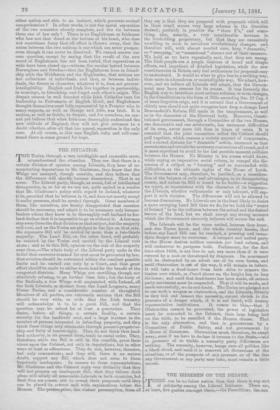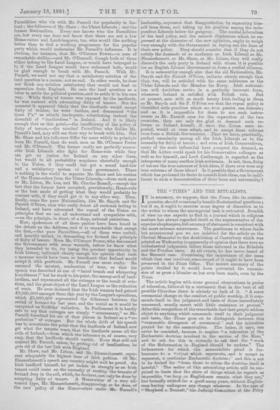THE IRISHMEN ON THE DEBATE.
TniERE can be no falser notion than that there' is any sort of solidarity among the Liberal Irishmen. There are, at least, five parties amongst them,—the Parnellitoe; the non
Parnellities who vie with Mr. Parnell for popularity in Ire- land ; the followers of Mr. Shaw ; the Ulster Liberals ; and the
former Nationalists. Every one knows who the Parnellites are, but every one does not know that there are not a few Home-rulers and Land-leaguers, too, who would like nothing better than to find a working programme for the popular party which would undermine Mr. Parnell's influence. It is obvious, for instance, that Mr. O'Connor Power,—a man of remarkable ability,—and Mr. O'Donnell, though both of them either belong to the Land League, or would have belonged to it, if the Land League would have welcomed both, would be glad enough to break with Mr. Parnell. With Mr. Parnell, we need not say that a satisfactory solution of the land question is a means, not an end. In other words, ho does not think any solution satisfactory that would not lead to separation from England. He uses the land question as a lever to settle the political question, and to settle it in his own way. While fixity of tenure was opposed by the landlords, he was content with advocating fixity of tenure. But the moment it appeared likely that the landlords would accept fixity of tenure, he went further, and denounced " the three F's," as utterly inadequate, substituting instead the downfall of " landlordism " in Ireland. And it is likely enough that on this point,—the insufficiency of the policy of fixity of tenure,—the nominal Parnellites who dislike Mr. Parnell's lead, may still see their way to break with him. But Mr. Shaw and his followers differ far more widely in principle from Mr. Parnell, than do such men as Mr. O'Connor Power and Mr, O'Donnell. The former really are perfectly reason- able Irish Liberals who fight for Home-rule while they can get no justice for Ireland on any other lines, but would in all probability acquiesce cheerfully enough in the Union, if they could but get a sound land-law and a satisfactory system of local government. There is nothing in the world to separate Mr. Shaw and his section of the Home-rulers from the Ulster Liberals,—from such men as Mr. Litton, Mr. Lea, and Mr. Charles Russell,—except the fact that the former have accepted, provisionally, Home-rule
as the best mode of getting what they would probably bo content with, if they could get it in any other way. Then, finally, come the pure Nationalists, like Mr. Smyth and Sir Patrick O'Brien, men who really detest all sectional feeling in Ireland, and have advocated the repeal of the Union on principles that we can all understand and sympathise with, —on the principle, in short, of a deep, national patriotism. Now, spokesmen of all these parties have been heard in the debate on the Address, and it is remarkable that except the first,—the pure Parnellites,—all of them were united, and heartily united, in demanding for Ireland the principle of fixity of tenure. Even Mr. O'Connor Power, who denounced the Government with some warmth, before ho knew what they intended to do, for losing the greatest opportunity in Irish history, indicated clearly enough his opinion that such a measure would have been so beneficent that Ireland would accept it with gratitude. Mr. Parnell was more crafty. He assumed the astutest, moderation of tone, so that his speech was described as one of "bated breath and whispering humbleness ;" but he stuck to his point, the money-evil of land- lordism, and represented all the outrages as the result of evic- tions, and the great object of the Land League as the reduction of rents. He even declared that the Irish tenants had gained £5,000,000 amongst them this year by the League's operations, which £5,000,000 represented the difference between the rental of Ireland for last year, and the rental as it would be computed on Griffiths' valuation. In Parliament it is hardly safe to say that outrages are simply " unnecessary," so Mr. Parnell described his use of that phrase in Ireland as a " re- probation" of outrages. But the whole drift of his speech was to accentuate the point that the landlords of Ireland now get what the tenants want, that the landlords cause all the evils of Ireland,—from which the inference is, of course, very easy, that the landlords should vanish. Even that will not content Mr. Parnell, unless, by getting rid of landlordism, ho gets rid of the last link with England. Mr. Shaw, and Mr. Litton, airid Mr. Blennerhassett• •
epi C.• sent adequately the highest tone of Irish politics. Of Mr. Blennerhassett's speech any country might well be proud. An Irish landlord himself, he yet insists as strongly as an Irish tenant could insist on the necessity of rooting the tenants of Ireland deep in the soil, which, he declares, can only be done by accepting fixity of tenure. A Home-ruler of. a very ad- vanced type, Mr. Blonnerhassett, disapproving, as the does, of the new policy of the Home-rulers under Mr. Parnell's
leadership, expressed that disapprobation by separating him- self from them, and taking up his position among the inde- pendent Liberals below the gangway. The cordial Liberalism of his land policy, and the earnest displeasure which he ex- pressed at the character of the new agitation, ought to weigh very strongly with the Government in laying out the lines of their new policy. They should consider that if they do not satisfy the demands of so moderate an Irish Liberal as Mr. Blennerhassett, or Mr. Shaw, or Mr. Litton, they will really discredit the only party in Ireland with whom it is possible for an English Liberal Government to form a cordial alliance. It is noteworthy enough also that the old Nationalists, Mr. Smyth and Sir Patrick O'Brien, indioato clearly enough that they, too, will be satisfied with the same minimum as the Ulster Liberals and the Member for Kerry. Irish national- ism will doubtless revive in a perfectly innocent form, whenever Ireland is satisfied with British rule. But at present, men with as much hearty Irish feeling in them as Mr. Smyth and Sir P. O'Brien see that the repeal policy is identified with practices which no true patriot can tolerate ; and as it is impossible for them to use such instru- ments as Mr. Parnell uses for the separation of the two countries, they are only too glad to demand such re- forms as Ireland herself, if once the Union were re- pealed, would at once adopt, and to accept these reforms even from a British Government. Thus we have, practically, perfect unanimity among all the Irish Liberals as to the necessity for fixity of tenure ; and even of Irish Conservatives, many of the most influential have accepted the demand, so that Mr. Litton could speak for his Conservative colleague as well as for himself, and Lord Castlereagh is regarded as the interpreter of many another Irish nobleman. Is not, then, fixity of tenure the true outcome of Irish ideas, if there ever were any true outcome of those ideas I Is it possible that a Government which has professed its desire to consult Irish ideas, can be indif- ferent to such a demonstration of their force and universality ?



































 Previous page
Previous page